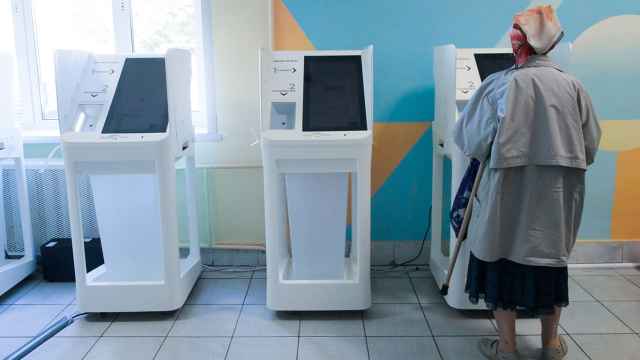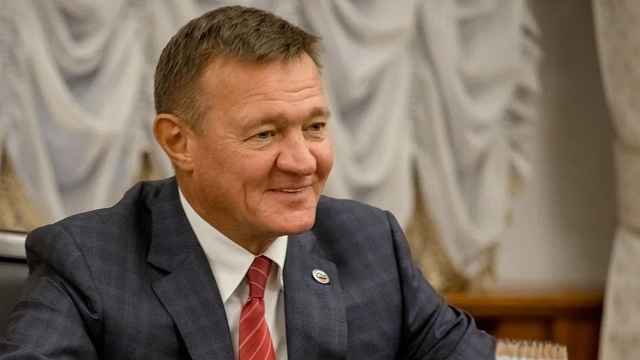In early November, the Russian government released its latest macroeconomic forecast. It could not have been an easy decision. Whereas President Vladimir Putin and his government campaigned in 2012 on a promise that the Russian economy would grow from 5 percent to 6 percent a year during his six-year term, the growth rate is now expected to average just 2.8 percent from 2013 to 2020.
Economic Development Minister Alexei Ulyukayev explicitly acknowledged that achieving the targets set by Putin "will take longer." In some cases, that means much longer. For example, in May 2012, Putin promised to increase Russia's labor productivity by 50 percent by 2018. The current forecast does not envision this outcome even by 2025.
A big piece of a shrinking pie is preferable to no piece of a growing one, which is what elites would receive in a fair legal system.
For independent observers, the ministry's grim forecast comes as no surprise. Judging by low stock prices and high capital outflows, investors were already betting against high growth rates. Putin and Prime Minister Dmitry Medvedev are pessimistic as well. Medvedev, who had been publicly forecasting 5 percent annual growth as recently as January, told foreign investors in October that this year's growth rate would not top 2 percent.
Previously, the government blamed the country's economic problems on the global slowdown. Today, that argument makes little sense. The global economy — and the U.S. economy, in particular — is growing faster than expected, and world oil prices are above $100 per barrel.
The ministry's forecast answers the perennial "who is to blame" question very clearly. The slowdown reflects Russia's own "internal problems." The ministry's baseline forecast assumes that the price of oil — Russia's main export — will grow at 9 percent per year in real terms over the next 17 years, or more than three times the forecast for Russia's annual growth in gross domestic product.
A week after the ministry's forecast was released, the European Bank for Reconstruction and Development, Russia's largest foreign direct investor, followed suit, cutting its growth forecast for Russia to 1.3 percent in 2013 and 2.5 percent in 2014. The bank's view was even more straightforward: The slowdown is the result of the government's lack of structural reform. Poor governance, weak rule of law and state-owned companies' assault on competition undermine the country's business climate and cause capital flight.
Russia's ruling elite understands very well that reforms are needed. When Medvedev was president, for example, he made a credible commitment to implementing the changes that Russia's economy needs. But Medvedev's one-term presidency, like Putin's administrations, did not deliver on these promises.
The Russian government's reluctance to fight corruption and strengthen the country's legal institutions reflects a perverse, yet stable, political equilibrium. In 2010, Yale University economics professor Aleh Tsyvinski and I predicted a "70-80 scenario" in Russia in the coming years: As oil prices, which had plummeted to $40 per barrel, recovered and surpassed $70-$80 per barrel, Russia would return to the stagnation of the 1970s and 1980s.
Sure enough, GDP growth from 2010 to 2012, though averaging a respectable 4 percent, turned out to have been driven by the post-crisis recovery and the further increase in oil prices to $100 per barrel. Now all of these short-term factors have been exhausted, and a Brezhnev-like period of stagnation has begun.
Russia's political elite understand that the economy is capable of 5 percent or 6 percent annual growth. The problem is that the reforms needed to achieve such growth — fighting corruption, protecting property rights, privatization and integration into the global economy — threaten the elite's ability to hold on to power and extract rents. For those in power, a big piece of a shrinking pie is preferable to no piece of a growing one, which is what most of the current elite would receive under a fair legal system with clear rules and predictable enforcement.
The November release of the ministry's grim forecast for growth is both surprising and welcome. At the very least, the authorities deserve praise for frankly admitting that Putin's promises are impossible to fulfill, rather than continuing to ignore, sugar-coat or divert attention from the evidence.
The growing realism of the government's internal and public discourse is no small matter. It is finally leading, for example, to the much-needed discussion of budget cuts. What this and officials' new candor mean more broadly for Putin's political future remains to be seen.
Sergei Guriev, a visiting professor of economics at Sciences Po, is former rector at the New Economic School in Moscow. © Project Syndicate
A Message from The Moscow Times:
Dear readers,
We are facing unprecedented challenges. Russia's Prosecutor General's Office has designated The Moscow Times as an "undesirable" organization, criminalizing our work and putting our staff at risk of prosecution. This follows our earlier unjust labeling as a "foreign agent."
These actions are direct attempts to silence independent journalism in Russia. The authorities claim our work "discredits the decisions of the Russian leadership." We see things differently: we strive to provide accurate, unbiased reporting on Russia.
We, the journalists of The Moscow Times, refuse to be silenced. But to continue our work, we need your help.
Your support, no matter how small, makes a world of difference. If you can, please support us monthly starting from just $2. It's quick to set up, and every contribution makes a significant impact.
By supporting The Moscow Times, you're defending open, independent journalism in the face of repression. Thank you for standing with us.
Remind me later.







